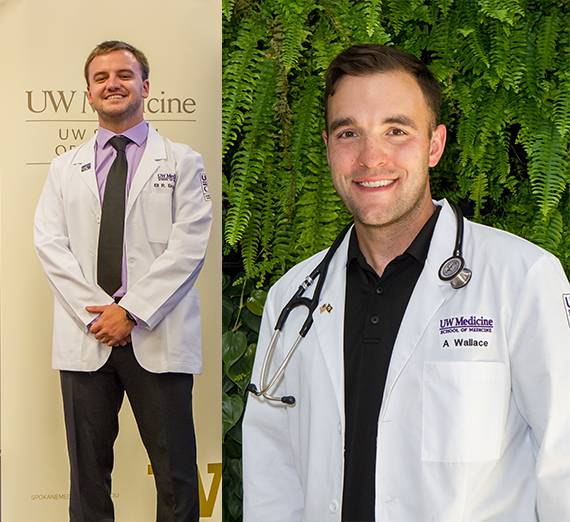Military in Medicine

UW School of Medicine Students Combine Health Care Careers and Military Service
A family history of medicine and military service.
Eli Engledow spent quite a bit of time in the emergency room as a kid, but not because he was accident-prone.
"My mom was an ER nurse," he said. "She later went back to school and became a nurse practitioner."
He regularly spent time in the hospital's break room in Clarkston, WA., waiting for her to finish her shift. Often, a physician would take him along to look at x-rays or show him another aspect of patient care.
Though he grew up in a small community in the Lewis Clark Valley, he had big dreams.
"I always wanted to do medicine," said Engledow.
He also wanted to serve his country.
In 2023, Engledow enlisted in the U.S. Naval Reserves.
He recently completed his first year of medical school at the UW School of Medicine (UWSOM) in Spokane. He deferred his five-week Naval Officer Development School due to his selection as a MedStAR scholar.
The National Institutes of Health (NIH) supports the University of Washington’s Medical Student Addiction Research (MedStAR) Program.
Each year, students participating in the program receive specialized mentorship and training in conducting addiction-related research during a nine-week summer Independent Investigative Inquiry block, a UWSOM requirement.
"It's a great research opportunity," said Engledow.
The collegiate swimmer chose to attend UWSOM in Spokane to be closer to his family in North Idaho.
The UWSOM and GU collaborate through a Health Partnership to advance research and medical education. It allows students synergistic educational and social opportunities and access to facilities.
Following graduation from medical school and residency, he'll serve four years of active duty in the Navy.
"I'm planning to apply for a military residency," said Engledow. "I hope to be sent to San Diego."
His early exposure to medicine may play a role in which specialty he ultimately chooses.
"I really like emergency medicine, but radiology also interests me. But I'm excited to see different aspects of medicine, so I'm keeping an open mind."
Non-traditional student sees his Air Force career as a stepping-stone to providing medical care across the globe.
A trip to Panama changed the trajectory of Adam Wallace's life.
While pursuing a political science degree at the University of Utah, he decided to study abroad in Panama and work with Floating Doctors.
"I fell in love with the mission and couldn't leave," he said. "I finished my degree online and moved to Panama for two years."
Floating Doctors travel by boat to remote locations, providing free acute and preventative healthcare services.
Though Wallace was an EMT, he spent his first year translating and later managed the pharmacy and clinic. He realized if he wanted to pursue relief work overseas, he'd quickly run out of money, so in 2015, he enlisted in the Air Force.
As a survival evasion resistance and escape (SERE) specialist, he was stationed at Fairchild Air Force Base in Spokane County.
Wallace earned a master's in public health and was selected to attend the Enlisted to Medical School Preparatory Program (EMDP2). He and his family moved to Washington, D.C., to prepare for medical school.
"I wanted to stay in the Air Force, so I extended my time of service," he said.
When it came time to apply to medical school, he went all out.
"I applied to 49 schools!"
He and his wife, Valentina Segovia, were delighted to discover they were returning to Spokane to attend UWSOM.

In 2023, he was named a Pat Tillman Scholar. Each year, the Pat Tillman Foundation awards 60 scholarships to active duty military members, veterans, and military spouses.
This year, his wife, who's earning her Doctor of Nurse Practitioner at Johns Hopkins University, also received a Tillman scholarship.
"We're only the third couple to be Scholars together," Wallace said.
He plans to specialize in emergency medicine, and when his Air Force service is complete, he and his family will return to where his journey began.
"I want to practice relief medicine—it's medicine in its purest form," he said. "No insurance companies, no bureaucracy. In the U.S. we are so blessed. I believe we have a responsibility to give back when we can."
